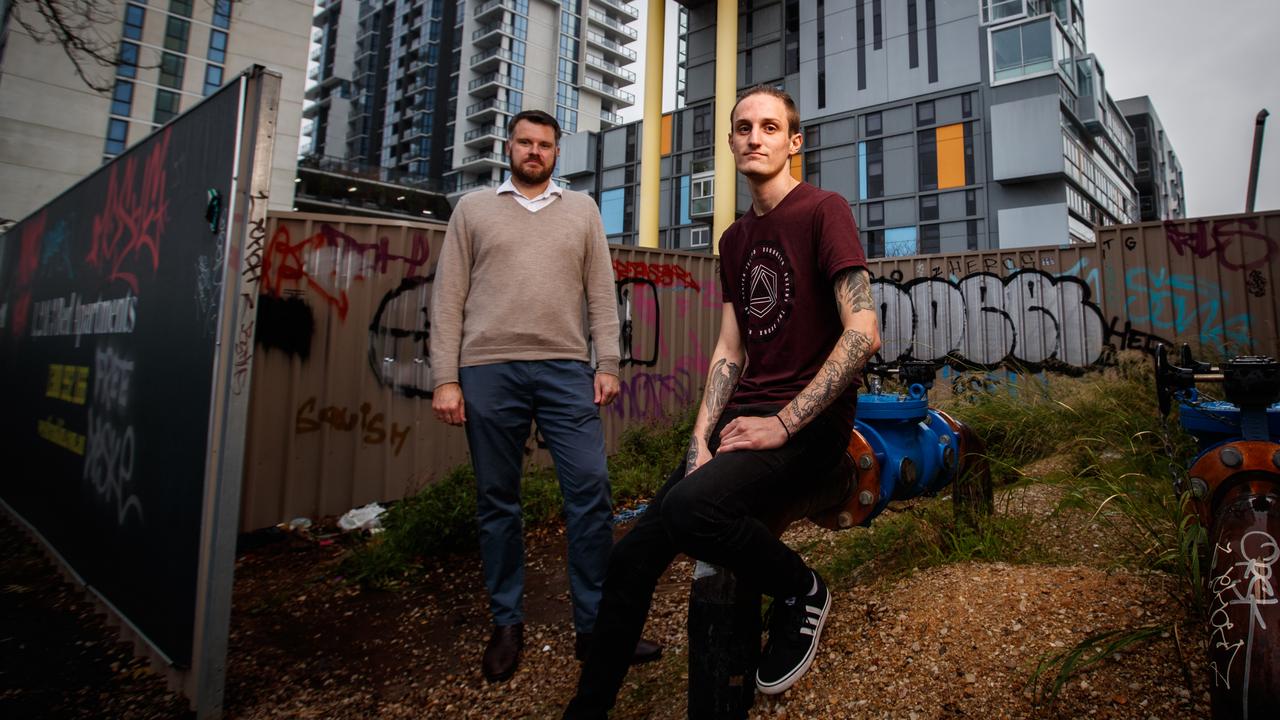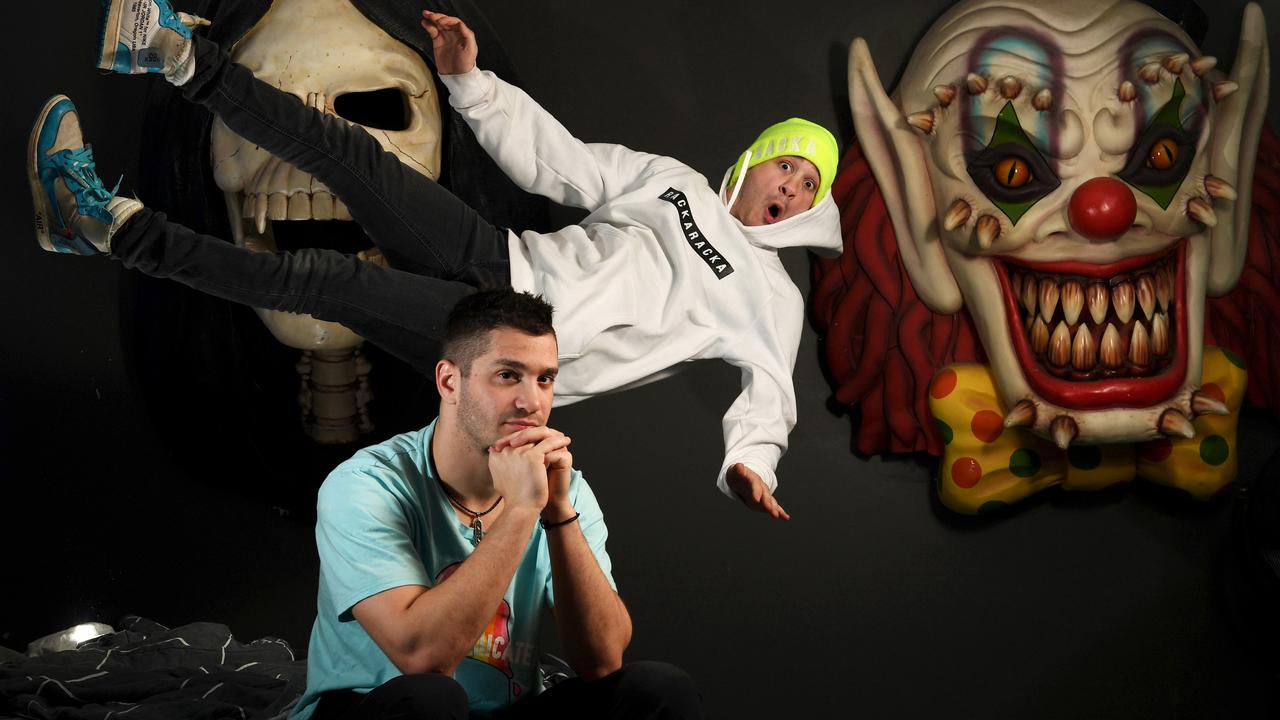Out of the blues: SA seafood king Michael Angelakis on winning his fight against depression
FOR more than two years, Michael Angelakis felt lost and depressed. Now he opens up about his bipolar disorder — and how he found the strength to endure and enjoy life again.
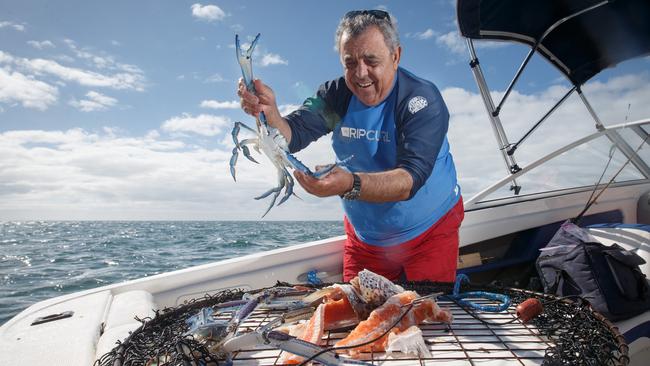
SA Weekend
Don't miss out on the headlines from SA Weekend. Followed categories will be added to My News.
TIME and tide wait for no-one, a fact Michael Angelakis has taken to heart. He’s racing across a cold and choppy sea off Yorke Peninsula, thudding into the waves so hard I need one hand to keep my hat on my head and the other to keep me on his boat.
But there’s a promise of fresh seafood at what Angelakis calls Crab Central, a sandbank out on the horizon, so there’s not a moment to lose.
All the time we thump along he’s talking, jumping subjects — about the boat, the crabs we may or may not be about to catch, his latest plans, his illness — or, he’s answering his mobile phone. “Fish n Chips!” he yells cheerfully down the line. It’s the name of the speeding boat and the greeting to every caller.
The immediate reason we’re here is to catch some dinner with our four crab pots and a couple of lines for squid. Angelakis worries we might be unlucky, though. We’ve set out a bit late from his bolthole on what they call millionaire’s row at Black Point, so he warns us that the tide may not be right for blue swimmer crabs. But since he’s got fish heads ready in the pots, what the heck? Let’s chuck them in and see what happens.
There’s another kind of tide though, and that gets to the bigger questions we’re here to discuss: the sort that flows in and out of a life, the full flood that Shakespeare said can take you to fortune; and the ebb that leaves you stranded, unsure if you are stuck forever, or just needing to lie still and breathe long enough to be picked up again.
Angelakis was beached for two years, washed up on the shore, struggling with mental illness. Now he’s afloat again, moving on currents he still cannot quite control, or be sure where they will take him — but at least he’s going somewhere.
The Out of the Blue seafood cooking show he has been filming since 2002 with old mate Michael Keelan is about to return to our screens, and he has a bagful of ideas to improve the fishing industry. He is also keen to do a bit of business again.
But if any of this is going to work, he has to manage the bipolar condition of his mind — the ebb and flow inside the channels of the brain. The shifts can send him low into depression, or push him into feeling so high, so absolutely brilliant, so truly ingenious, that he doesn’t need to belt across the water in his boat — he thinks he can just walk right across it.
Where do the storms come from, the ones that blow your world away, and send your compass spinning? Angelakis must have wondered about that as he lay in hospital in early 2001, about to undergo surgery for a malignant cancer, unsure whether he would come out of the operating theatre alive.
He was 50. He looked around the hospital room, reconciled to death, saw Silvana, the mother of his four children, and said: “If I wake up, I want you to be there. I’ve had the most incredible life; I’ve led the life of Riley. If it is my time then so be it. I’ve done everything I wanted to do. There are no regrets.”
But the cancer didn’t kill him, not that day. That day it was beaten. It would return, and it would be incredibly difficult, but that was for the future. When he woke up Silvana was there. A bad day, yet a good day.
In time another storm blew in, but more slowly, like a gathering gloom. He became depressed. For years, he struggled. He’d shun company, even that of his family.
But the lowest moment came in 2015, on the wedding day of his only daughter Zoe, a day that should have been one of the happiest in his life. Instead, for a long while, it seemed he couldn’t even get up.
“It was our only daughter, but I didn’t get out of bed until 1.30. That’s how sick I was,” he recalls. “I was a mental wreck. Can you imagine what was going on in my mind? My only daughter … the proudest dad not walking her down the aisle?” His eyes are full of tears.
“They had alternative plans ... I wouldn’t have forgiven myself. But I wasn’t going to let her down at all.” He got out of bed. He made the ceremony, and his speech at the reception. “And we didn’t go to bed until three or four in the morning.”
He weathered that storm, too.
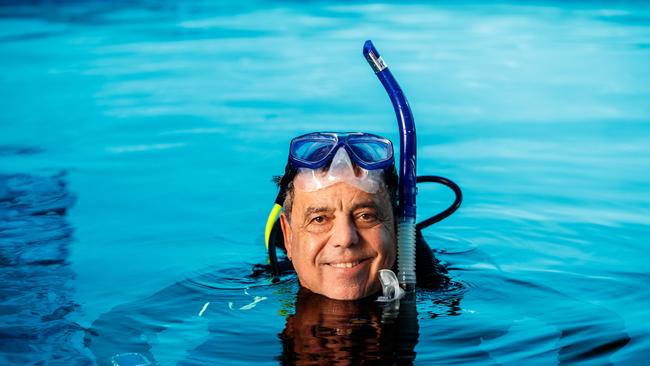
For those who only know Michael Angelakis from his ad-lib, loud, funny antics on Out of the Blue, it must be quite a shock to think of him spending most of his days in bed, as he did for the better part of 2014 and 2015. He was in a black hole.
As his artist wife, Silvana, puts it, he spent two years lying in his own coffin, breathing. Only now is he emerging from it.
When he looks back, he wonders if some of the storms were brewing well before they spent their fury on him. His father, George, had several breakdowns. His mother, Dikea, was manic depressive (bipolar). And his grandfather died of cancer.
But in life the traits you inherit make you as well as break you. As we sit in the rocking boat, and photographer Matt Turner keeps pulling up haul after haul of blue swimmer crabs, Angelakis talks of times good and bad, as he tries to unravel the tangled story of his troubles.
He grew up on the sea. It was his backyard at Thevenard, on the West Coast, in a little Greek community where his grandfather, a sponge diver, had settled in 1928. As a kid he’d be given bread and a jar by his grandmother and told not to come back until he had enough whitebait for fritters.
His father was a labourer, until one day after rowing his dinghy to the blue line, the deep water, the fish he caught earned more for him in one week than what he would have been paid over six weeks on land. The die was cast, brother Nick and brother-in-law Sam Sperou joined in, and Angelakis Bros was born.
It was an idyllic childhood, until the family relocated to suburban Woodville, when the young prince of Thevenard had to wear a uniform and go to primary school.
“I was a bit of a ratbag,” he confesses. He was not very academic. He wanted to be a marine biologist but “the headmaster said: ‘listen Angelakis, all you are good for is the family business’.”
But was there ever any real alternative to the family business? “Yes there was,” he insists. His father didn’t want him in fishing, he wanted him to go to university.
Angelakis wasn’t made for academic rigour, but he did enjoy roles in school plays. He’s the theatrical type. Sometimes he’ll tell you a story, or deliver a phrase, and you know he’s done it many times.
He’s not tall, and he’s a lot heavier than he’d like to be. But at 65 he still has a boyish quality, a toothy grin and enthusiasm that radiates a genuine liking for people.
He loves being the centre of attention, which can be trying for others. Some who’ve been out to dinner with him recall how he’ll spend a lot of the evening doing the rounds of the room instead of sitting with them.
And while he’s generous with his time for others suffering cancer, some of his friends worry that it keeps him in a time warp, thinking about his own health. Yet they know his need to interact makes him what he is.
Some people stand back and watch life, but Angelakis walks up and gives it a hug, then tries to sell it some fish — or whatever else he can offer. “My favourite saying,” he says, “is there’s always a deal.”
That’s how he started out. “You’re a fishmonger, why don’t you supply us?” some Chinese mates asked him. “So I said, ‘OK, I’ll go get it’. I borrowed Uncle Sam’s poultry truck, which was a ute, and drove to Raptis on Port Rd, and said I want a carton of prawn meat and prawn cutlets. This took me an hour.
“I bought 40 kilos. I came back and said, Uncle Sam you know what, I just made $40. If I get it twice or three times a week, and I get 10 or 20 restaurants, this is easy. So, at the little fish factory, Uncle Sam was my secretary, my receptionist, and he did all the books. I had the office, a desk, two phones.”
The young Angelakis expanded interstate, started buying and selling lobster meat, undercutting Raptis thanks to his low margins. “And what happened was, and I’m not showing off, I got a reputation: that if you want a deal, see Angelakis,” he says. “Without a word of a lie, I left that little factory in the late ’70s, turning over by myself $25 million. Working two phones.”
The love of the deal, of company, of lunches, helped make Angelakis successful. It’s hard to know whether this out-sized personality was even then just one side of the bipolar condition. On the other side was Silvana, the sheet anchor that worked to keep the boat from listing too far. A Slovenian, she radiates a quiet strength, but even so she feels the strain.
Typically, Angelakis talked too much when the pair first went out, showing off, trying to impress her as a young bloke who fancied himself as a bit of an Apollo. “As soon as I saw her I was done and dusted, the Greek God fell over. I made a fool of myself that night. I just went over the top to impress her, and then I said, ‘I’m boring you’. That was my saving grace. We’ve been together 40 years.”
He’s needed her. Silvana, says one friend, is an understanding woman whose art has given her an alternative focus, “but even those sorts of people have their breaking point. I’m sure she’s close to the limit from time to time. It’s a bit of a high-wire act.”
For Angelakis the big mental and physical challenges began late in 2000. He was soon to turn 50, and was hosting a boardroom lunch when he began to feel unwell.
“I just fled, I was in so much pain. I rang the doctor, and he gave me two injections. Silvana said, ‘you’ve over eaten again haven’t you?’”
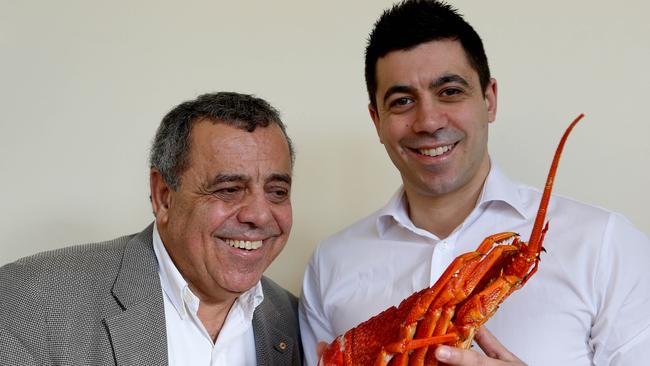
But the pain came back, and he knew something wasn’t right. A big cancer in his stomach, the size of a rockmelon, was pressing hard on his insides. Malignant and aggressively spreading, it required immediate surgery, but within a month scans showed it had metastasised to three other places.
Angelakis says the cancer diagnosis, the operation, and then the terrible news that it had returned were all big blows. But he still had a 50th birthday party for several hundred guests, including the likes of Kim Beazley, before the operation. He took to piscatorial terms to make sense of the illness: the first tumour was a lobster, the offshoots were prawns swimming around inside.
When they sliced him open it was all the way down to his tommy ruff. Then after that operation came the pills, the intravenous chemotherapy, including two nightmarishly painful lumbar punctures a week. He had so many injections his veins collapsed.
“What kept me going was my attitude. I had a strategy. I used to wake up in the morning, they would unhook me, so I had a shower. Then I’d go for a 10 or 15-minute walk around the garden or the rooms. I’d share trade. That was my distraction.
“You needed to find one thing in the day that you could reflect on to bring you happiness, because you’re in a cancer ward where everyone is dealing with death and mortality.”
His friend, Nick Bolkus, the former Labor senator and a pal since student days, believes you can’t separate the cancer from his mental troubles. “It really messed with his brain,” says Bolkus. “He had it; he didn’t have it; then he had it again. It was a nasty strain as well. Since then there’s been a degree of instability borne out of insecurity. More recently he had another scare which turned out to be OK — but it puts pressure on you mentally.”
Bolkus says Angelakis is “generous, but a real challenge — and the challenging bit is the mental inconsistency”. Has it always been there? “No. I think it’s a deep-seated insecurity; but as a teenager and most of his working life there’s never been signs of that.”
Angelakis was shocked by the cancer, but also something his youngest child told him. As he reflected on his life, all the work he’d done, his focus on building relationships and business, had he neglected the people who mattered most?
“Nathan was six and I was 50 when I had cancer. Basically I was written off. And he comes in and says: ‘Daddy, you give away all your love and there’s no love left for me’. I said, ‘what do you mean?’ He says: ‘It’s true Daddy. I know what you do for other people and how you talk on the telephone. There’s no love left for Mummy, for Zoe or Jordan or Zac or me’.
“I was vulnerable. The dagger, the javelin, went into my heart. I was just a mess.”
But, unthinking, in the usual bold persona he adopted for his other world, he told a radio interviewer about the conversation.
“I was very open. There’s a Greek saying my dad taught me: I stand naked before you, it’s who I am and what I am. So I told him about the kids. I told him what Nathan told me.
“Later, [pleased with himself] I said: ‘Natty, you know what you told me the other day, I just did ABC radio about it, and I’ve got a cassette. You want to hear it?’
“He said: ‘Daddy, I told you that privately’.”
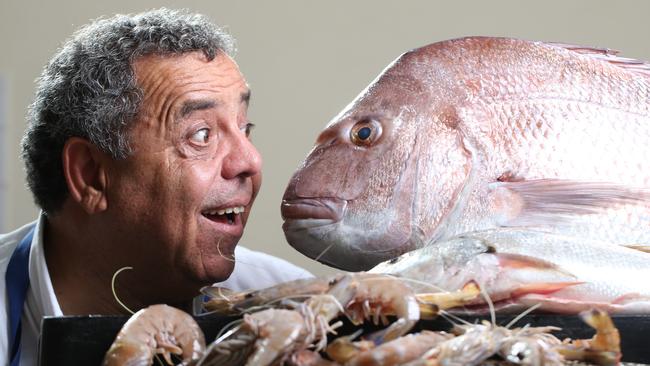
In the years following the cancer Angelakis found himself becoming withdrawn, even from his family. In 2008, he was diagnosed with bipolar disorder, a condition characterised by extreme mood swings, high and low.
Like the tides.
These days, Silvana helps her husband be aware of where he is in this ebb and flow as he aims — with the help of medication — to keep himself somewhere in the middle.
“If I’m elevated, which is just as dangerous in bipolar disorder, Silvana says ‘high tide Michael’ and that way I don’t get reactive or defensive,” he says. He saw a psychiatrist for pills in various doses to try to manage the condition, and a psychologist to learn cognitive therapies that helped with skills to deal with his own thinking. The drugs have been a struggle. “I said to Silvana: ‘Who am I? I don’t know who I am anymore. Tell me.’ That was a worry to me.”
But ultimately he knew it was up to him to try to wrest control back. “At the end of the day it all comes back to you,” he says. “And that’s the hardest thing. I fell into the abyss this time. I couldn’t see any light. Not even a shaft or a thread. I became immobilised, introverted, I became solitary — I had no motivation at all.
“I lost self-esteem, independence, self-worth. What was I giving? I was lying on a bed, on a couch, one day became two days, two days became three, three became a week, they became months.
“It was a horrible, immobilising illness. What it does to your family is awful. It causes distrust, and resentment. You say you’re going to get better but until you prove it …”
The couple’s four children, Jordan (hedge fund manager), Zoe (graphic designer), Zac (construction manager) and Nathan (marine biology student) are all adults now. It was Angelakis’s vision to work with Jordan and have him run the business. But when he announced in mid-2013 he intended to step down as managing director and hand over to Jordan in 2016, things did not work out.
Perhaps, some think, he would have done better to smooth the way with the rest of the family running the operation first. But Angelakis, the proud father, says his son was forward-thinking, clever, socially adept and would have been perfect.
“Then, I got so sick. I left, and I wasn’t there to protect my son,” he says. “That was one of the greatest issues I had to deal with, with the psychiatrist. I felt bad that I wasn’t there to work with him, protect him, mentor him. In the end he got sick. But today, he is better off than anyone. He was head hunted by a private hedge fund.”
Angelakis is still the biggest shareholder in the family operation — but does not have a controlling interest. Silvana has power of attorney because of the illness that forced him to quit his company role two years before his retirement. He has been in mediation with CommInsure about a $1.5m insurance claim over the impact of the illness on his ability to work. The health battle has been hard, but Angelakis says they are moving on.
As we sit on the deck at their Black Point townhouse, Silvana is inside, preparing meals for weekend guests. “I can honestly say that with Silvana, if I had 20 lifetimes, nothing would change. I don’t look for love, she gives me all the love I need.”
And then Angelakis opens up on a day in his life he thinks was in some ways as tough as facing cancer. The one when he offered to leave his wife. “I love her so much, I said to her: ‘Listen, I’m going to leave. I just can’t do it anymore Silvana.’ I said to her: ‘I love you so much that I just can’t live with myself, the way I’m tearing you guys apart. I don’t want to hurt you guys any more, let’s protect what we’ve had all these years.’”
And she said? “In good health and in bad health, I love you.”
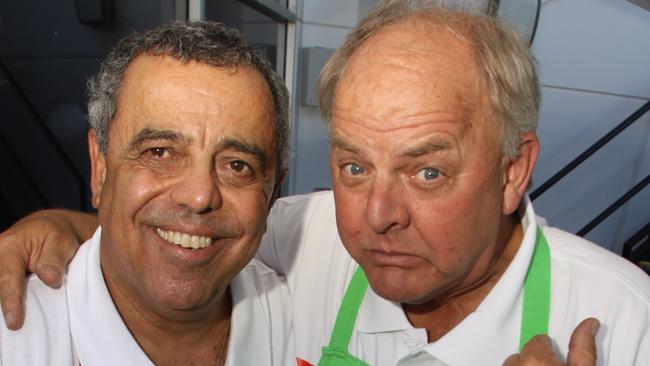
Despite the darkness, Angelakis insists he never contemplated ending it all. “I was back here (Black Point) for one month in 2008,” he recalls. “A friend rang and said he was coming to get me. I said, ‘I need to be here, no I’m not coming’. I said, ‘do you think I’m going to get my boat, go out to sea, get the anchor chain and wrap it around my leg and throw it over?’ I said, ‘the water’s cold, it’s going to hurt, and how am I going to get my anchor back — it cost me a lot of money’. Never, ever, would I do that.”
Lately, friends have noticed Angelakis is sounding more like his old self. “Very much so,” says Bolkus. “There’s a lot more consistency in recent months. He knows his weaknesses. He’ll say, ‘I’ll forget, send me a message’.”
Angelakis believes the catalyst for his gradual recovery has been cooking. “I was watching a lot of cooking shows,” he says of his life on the couch. So he watched Silvana cook, and then started cooking for the family. “Gradually I got my confidence back.”
Out of the Blue also offered something manageable. It wasn’t a full-time job, it was familiar territory, with old friends like Michael Keelan, with whom he’s been cooking for about 32 years on one show or another.
Keelan, the more reserved horticulturalist who says he’s yin to Angelakis’s yang, confirms the fishmonger’s enthusiasm seems to be back. He says what you see is what you get with Angelakis.
It is a genuineness that hits a nerve with the public, but even Keelan admits he was taken aback by the “thousands” of people who asked him during that two-year absence: “How’s your mate?”
Angelakis pays a price for his generosity, says Keelan, touching on the same problem six-year-old Nathan once tried to make his dad understand. “He can’t say no,” Keelan says. “It runs him ragged. He has to lead a quieter life. Everyone can see it, but he can’t.”
Angelakis wheezes a lot when he talks. He’s developed bad asthma, to the point that many times he simply can’t keep talking. But it barely seems to slow him down. His plan for the day is to catch us some crabs — but only enough to eat, so three or so each — and then maybe pluck some scallops from the sea bottom, closer to shore.
He has his wet suit, and a couple for us as well. “I want to go have a snorkel,” he announces after we’ve caught enough crabs, “anyone going to come in with me?”
It’s miserably cold, the water is murky. The response is unenthusiastic. “Oh, come on!” he sounds hurt. He’s soon in, but not for long. You can’t see much down there, and certainly no scallops. But since this is his backyard, he’s not coming up empty-handed, instead producing a beautiful cowry shell for photographer Matt Turner’s daughter.
Spotting a treasure in the gloom is a metaphor for what Angelakis seeks to do every day now. Begin with a walk, turn off his phone when he drives, listen to music, give himself a chance to discover pleasures in unexpected places. He has no intention of drifting quietly away.
He’s been thinking about how to invigorate fishing in SA, as the world demand for seafood rises but ocean stocks struggle. “What I’d really like to see is a recreational fishing fee — excluding kids and pensioners — because there’s not enough money for research.”
He says Eyre Peninsula fish producer Cleanseas has a world-class hatchery and could help restock the oceans with fingerlings — just as happened in the rivers with Murray cod recently — but for fish like snapper and mulloway, native to SA waters.
“Where are we going to get food?” he asks. “We have to be far more clever, we’re not farming enough species for the market. There’s a limited fishery, limited entry, season. We have marine parks, but how much more are we going to strangle our resources? Let’s get off our arse and grow food.”
The industry, he says, needs to be more entrepreneurial, to create new products using the bycatch, trimmings and offcuts.
For Michael Angelakis, the tide is moving again. So will he aim for the calm dodge tide? No. “That’s a bit boring for me,” he admits. “What I’m working on is being happy. But I don’t want to get too elevated. Then you become manic again. You think you’re good, and you can walk on water.”
So how will he know if that tide is too high?
“Talking, talking,” he says. “Not listening, listening.”
Out of the Blue begins on Channel 7 on July 23
If you’re concerned about yourself or anyone you know, you can contact:
Beyond Blue on 1300 22 4636/beyondblue.org.au
Lifeline on 13 11 14/lifeline.org.au

